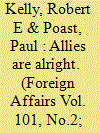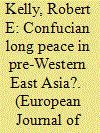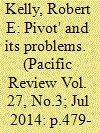|
|
|
Sort Order |
|
|
|
Items / Page
|
|
|
|
|
|
|
| Srl | Item |
| 1 |
ID:
186795


|
|
|
| 2 |
ID:
117052


|
|
|
|
|
| Publication |
2012.
|
| Summary/Abstract |
International Relations theory about East Asia has increasingly argued that East Asia before Western penetration enjoyed a protracted peace. As explanations, a Chinese military hegemony would fit realist theory fairly well, while a cultural peace based on shared Confucian norms would be a significant anomaly. A Confucian Long Peace challenges widely held, albeit Eurocentric, realist presumptions including the perils of anarchy, the arms-racing and misperception of the security dilemma, and the regularity of power balancing. This article therefore investigates, first, whether such a peace did in fact exist, and, second, whether this might be attributed to Confucianism. A cultural peace theory requires a strong anti-war cultural norm and a shared sense of community. Skepticism is established by examining three comparative cultural spaces that nonetheless did not enjoy a culturally informed peace: the classical Greek city-state system, early modern Christendom, and the contemporary Arab state system. All were deeply riven and competitive. Nevertheless, empirical investigation of the last Chinese (Qing) dynasty before the Western arrival (1644-1839) demonstrates that it was remarkably peaceful toward its Confucian neighbors, while more 'normally' exploiting its power asymmetry against non-Confucian ones. Process-tracing specialized Chinese practices toward fellow Confucians suggests that the low Confucian war finding emanates from cultural restraint.
|
|
|
|
|
|
|
|
|
|
|
|
|
|
|
|
| 3 |
ID:
110243


|
|
|
|
|
| Publication |
2012.
|
| Summary/Abstract |
In 2009, Korea and the European Union (EU) signed a free trade agreement. Using a traditional list of state goals in foreign policy - national security, economic growth, prestige-seeking, and values-promotion - I examine the prospects for cooperation and integration in the future. I find that deeper engagement is unlikely. Most importantly, neither side is relevant to the basic security issues of the other. Specifically, the EU cannot assist Korea in its acute security dilemma, and 'sovereigntist' Korea does not share EU preferences for soft power, regionalization, and multilateral collective security. However, Korea is likely to pursue the relationship for cost-free prestige-taking. And the EU will understand this 'Asian bridge' as a success for the promotion of liberal-democratic values in a non-European context. Pro-regionalist elites, most notably the 'eureaucracy', may pursue 'inter-regional' ties for internal institutional reasons, but deep Korean attachment to the Westphalian state model will likely stymie such efforts.
|
|
|
|
|
|
|
|
|
|
|
|
|
|
|
|
| 4 |
ID:
167950


|
|
|
|
|
| Summary/Abstract |
The years 2017–2019 have been remarkable in the long stand-off with North Korea,
as much for the drama of war-threats and then summits, as for the durability of the
North Korean status quo. Indeed, given all the sturm-und-drang of both hawkish
and then dovish approaches to North Korea since 2017, the greatest surprise is how
little both alternatives have accomplished ‘on the ground.’ This essay investigates
surprise—why is the North Korean status quo so persistent? Specifically, why
have the hawkish and dovish deviations from the status quo since 2017 so failed
to change much? Several hypotheses derived from levels of analysis theory in
international relations are suggested. In brief, a leader level analysis would focus
particularly on Trump’s personality—his swings of interest, his personalistic
bargaining style, his sloth, his chaotic staffing. A domestic analysis would identify
the divisions within both the United States and South Korea over policy toward
the North. And a structural answer would posit the value of nuclear deterrence
as the cause particularly of Trump’s failure to budge Pyongyang. Because North
Korean intentions, particularly Kim’s psychological preferences, are only poorly
discernible, assigning causal weight to each hypothesis is quite difficult so long as
the North’s opacity persists. Hence this essay focuses on concept and hypothesis
development while nonetheless laying out what evidence there is.
|
|
|
|
|
|
|
|
|
|
|
|
|
|
|
|
| 5 |
ID:
131358


|
|
|
|
|
| Publication |
2014.
|
| Summary/Abstract |
This paper posits four ranked, generic goals of state foreign policy, maps them against the American 'pivot,' and concludes with possible handicaps of that shift. Drawn broadly from realism and liberalism, those abstract goals are as follows: national security, economic growth, prestige among the community of states, and the promotion of cherished national values. Applying this framework specifically to Northeast Asia, the USA, regarding security, is likely to increasingly 'hedge' China, and its North Korean client, with regional allies, off-shore balancing, and a shift toward AirSea Battle. On trade, the USA will continue its decades-long effort to reduce Asian mercantilism by tying Asian traders into multilateral, neoliberal rule sets. Regarding prestige, the 'Beijing Consensus' is a growing challenge to US soft power which the pivot seeks to refute. In addition, on values, the USA will continue to nag especially China to conform to US standards of law and human rights. The USA will continue to push the broad liberalization of Asian polities and economies. The democratic peace and liberal trade are the ideological frame and motivation of the pivot. Nevertheless, significant US handicaps may slow the pivot: American cultural distance from Asia means little public support and understanding of its necessity; strong regional allies will tempt the USA toward offshore balancing on the cheap; and the dire US budget shortfall will reduce the resources necessary to fund it.
|
|
|
|
|
|
|
|
|
|
|
|
|
|
|
|
| 6 |
ID:
079939


|
|
|
|
|
| Publication |
2007.
|
| Summary/Abstract |
The relevance of regional security theories has grown in the wake of the Cold War. The global system has more participants-is less Eurocentric with Third World states having greater autonomy and involvement-and clearly unipolar, shifting the locus of conflict down from the global level. A new wave of regionalist scholarship has arisen in response. This review identifies this literature's central themes and suggested new variables. Its foundational and most contested challenge to international relations (IR) theory revolves around the autonomy of a regional level of analysis between the state and the globe. Accepting such autonomy, the literature broadly settles on three variables specific to regional structures. First, regional subsystems are porous. Intervention from above can overlay local dynamics. Second, proximity qualifies the security dilemma dramatically. Most states only threaten their neighbors, thus creating meaningful and distinct regional dynamics. Third, weak state-dominant regional complexes generate a shared internal security dilemma that trumps the external one. Regional organizations serve to repress shared centrifugal threats through pooled rather than ceded sovereignty
|
|
|
|
|
|
|
|
|
|
|
|
|
|
|
|
| 7 |
ID:
154934


|
|
|
|
|
| Summary/Abstract |
If one understands North Korea’s provocations as terrorism rather than irregular
warfare, then terrorism is arguably a chronic national security threat to South Korea.
Similarly, the modernization of South Korea has put its citizens, corporations, and
soldiers out into the world and raised their exposure to traditional non-state (Islamic,
nationalist, and so on) terrorism. Yet South Korea’s two national security strategies
to date scarcely touch on the issue, while Korea’s foremost security journal, the
Korean Journal of Defense Analysis, has only published a handful of articles on
the topic. Hence, this article seeks to place terrorism more coherently within South
Korea’s growing grand strategy debate. It argues that Northern provocations fit
within post–9/11 thinking about terrorism, and that South Koreans are targets of
opportunity in the current salafist terror wave due to their alliance with America,
Protestant evangelization overseas, and status as Buddhists, Confucians, or
Christians in jihadists’ “clash of civilizations” mindset. Terrorism event counts
against South Koreans, including fatalities, are quantitatively presented. The totals
are low, so the threat, while new, is middling, not existential. South Korea need not
overreact as America arguably did to 9/11. Policies such as moderate homeland
security measures, distance from expansive U.S. goals in the war on terror, and a
wariness of Middle Eastern engagements are recommended.
|
|
|
|
|
|
|
|
|
|
|
|
|
|
|
|
|
|
|
|
|